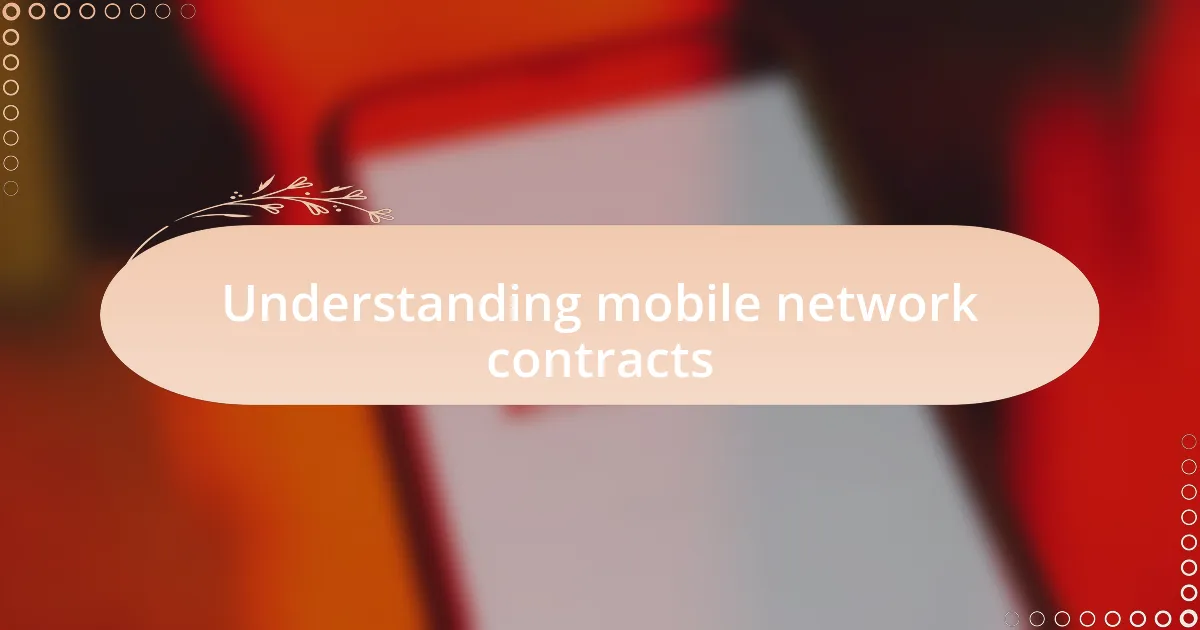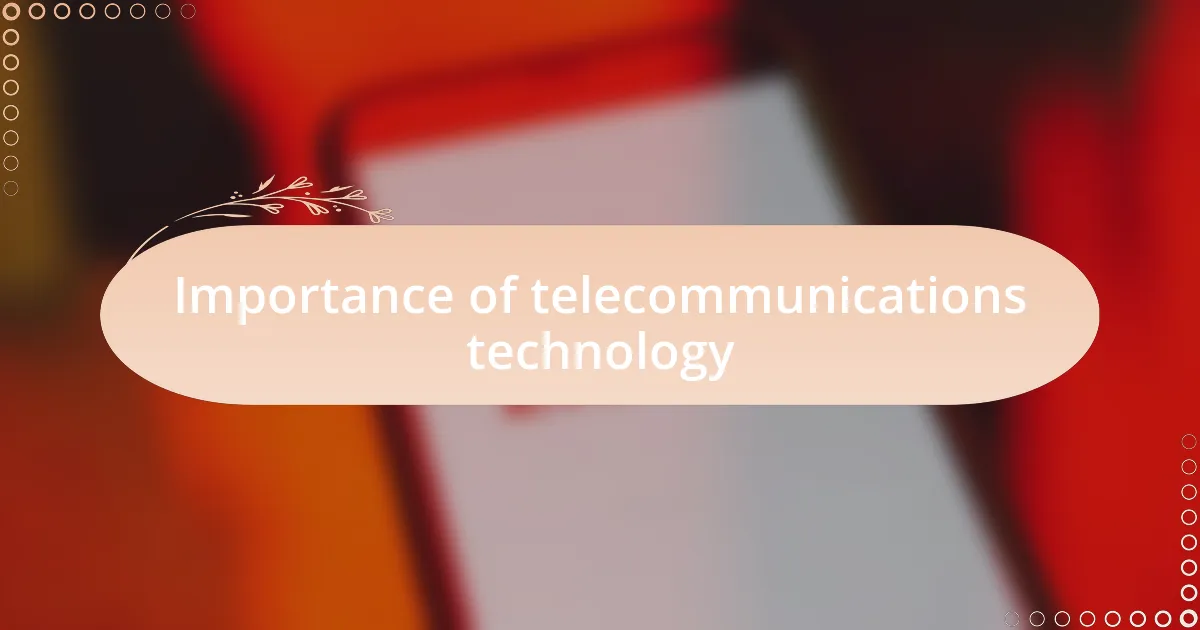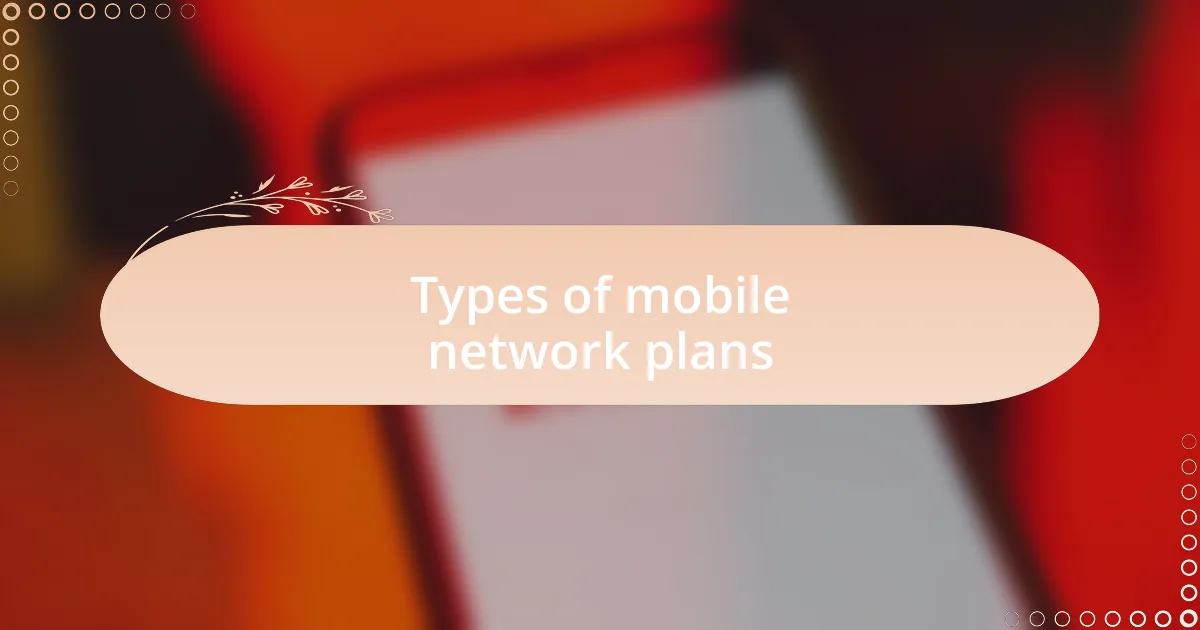Key takeaways:
- Understanding mobile contracts is crucial to avoid unexpected costs and select a suitable plan based on personal usage.
- Telecommunications technology enhances personal and business communication, improving access to services and information.
- Negotiating mobile contracts effectively can lead to better deals, including additional perks, by leveraging competitor offers and thorough research.
- Shared plans can significantly reduce costs, and personal experiences highlight the importance of reviewing contract details before making commitments.

Understanding mobile network contracts
When diving into mobile network contracts, it’s essential to understand the fine print. I remember the first time I signed a contract; I was overwhelmed by jargon like “data caps” and “early termination fees.” Have you ever felt lost in the details of something that should be straightforward? This confusion can often lead to unexpected costs.
Contracts can vary significantly between providers, so knowing what you’re signing up for is crucial. I experienced a situation where I found myself locked into a lengthy commitment with high fees for exceeding my data limit, though I didn’t think I was a heavy user. Have you checked how your usage stacks up against your plan? Understanding your consumption habits can help you choose a plan that suits you better.
Moreover, take the time to compare options and negotiate terms. I once switched providers after realizing that a competitor offered the same features at a lower monthly cost. It’s astonishing how a little research and questioning can lead to significant savings and a more suitable plan. Have you revisited your contract lately? Sometimes, the best deals are just a conversation away.

Importance of telecommunications technology
Telecommunications technology serves as the backbone of modern communication, connecting people efficiently across vast distances. I recall a time when my family lived overseas; the ability to video chat instantly transformed how we maintained those relationships. Have you considered how much easier it is to share moments that matter, thanks to these advancements?
Moreover, reliable telecommunications enables not just personal connections but also supports businesses in thriving. I once worked with a startup that relied heavily on seamless communication tools; their success hinged on the ability to collaborate in real-time with a remote team. Isn’t it fascinating how critical connectivity is for turning innovative ideas into reality?
As we navigate daily life, telecommunications also enhances access to information and services, bridging gaps that once seemed insurmountable. For instance, using telehealth services during a recent illness was a game-changer for me; I felt relieved not to have to visit a doctor in person. How has technology improved your access to essential services? These innovations not only save time but improve our overall quality of life.

Key components of mobile contracts
When examining mobile contracts, one of the most critical components is the plan type, which can vastly influence monthly expenses. I remember when I first switched to a family plan; it saved us so much compared to individual plans. Have you ever considered pooling your needs with friends or family? These dynamics can lead to significant savings.
Another essential aspect is the contract’s length. Typically, you’ll find contracts ranging from 12 to 24 months, with longer commitments sometimes offering better deals. I once locked myself into a two-year contract when I didn’t really need it, and the regret was palpable as my phone cravings changed. Have you weighed the balance between commitment and flexibility?
Lastly, understanding the included features—like data limits, rollover options, and additional perks—can truly enhance your mobile experience. When I discovered unlimited streaming was part of my plan, it felt like a new world opened up, allowing me to binge-watch my favorite shows on the go. Isn’t it amazing how the right features can transform your usage?

Types of mobile network plans
Mobile network plans generally fall into several categories, each tailored to different types of users. For instance, I’ve found prepaid plans to be incredibly liberating; they offer the freedom of not being tied down to a long-term contract. Have you ever felt the weight of a commitment hanging over your head? With prepaid options, you can pay for what you use, which means you have the ability to scale up or down as your needs change.
Another common plan type is the postpaid plan, where you pay after using the service. I remember switching to a postpaid plan after my usage skyrocketed; the convenience of knowing I wouldn’t run out of data mid-month was a relief. But, you just need to be cautious about overage charges—they can sneak up on you if you’re not careful. Have you accounted for how much data you actually use each month?
Family or shared plans are also quite popular, as they allow multiple lines under one account. When I joined a family plan with a couple of friends, our individual costs dropped significantly, and it turned into a fun way to stay connected. It’s surprising how bundling services can lead to such savings and strengthen relationships. Have you thought about how sharing a plan might benefit your wallet and your connections?

Tips for negotiating better contracts
When negotiating mobile network contracts, it’s crucial to do your homework. I remember the first time I stepped into a store with just a vague idea of what I needed; I walked out feeling overwhelmed and slightly cheated. By researching plans and competitors beforehand, I felt empowered and better equipped to advocate for my needs. Have you ever walked into a negotiation without a solid grasp of your options?
One effective strategy is to leverage competing offers. I once showed a potential provider a better deal I found from another company, and it instantly changed the conversation. The representative was more willing to offer discounts and unexpected perks to keep my business. Have you considered using offers from competitors to strengthen your position?
Don’t shy away from asking for extras. In a recent negotiation, I simply requested additional data on my plan, and I was surprised by how willing the provider was to accommodate my request. It made me realize that many perks are often left off the table unless you ask. What’s the worst that could happen if you ask for a little more?

My personal experiences with contracts
I still vividly remember my experience with my first contract. I was so excited about getting a new phone that I overlooked the fine print, not realizing I had signed up for a two-year term with a hefty cancellation fee. That was a tough lesson about being attentive to the details, and it taught me the importance of thoroughly reviewing every clause before committing.
During my next contract negotiation, I took a different approach. I sat down with the salesperson, determined not to just accept what was offered. As I discussed my usage patterns and future needs, I felt a shift in the atmosphere. The representative saw me as more than just a customer, and we ended up tailoring a plan that suited me perfectly. Have you ever felt that empowerment in a negotiation?
Another memorable instance was when I decided to switch providers. I was anxious about breaking my contract with my previous carrier, but I felt compelled to prioritize my budget. When I called to cancel, I was surprised by how quickly they offered me incentives to stay. It was a real eye-opener for me—often, companies will go the extra mile if they see you’re serious about leaving. What’s your experience been with providers when it comes to loyalty versus the allure of switching?